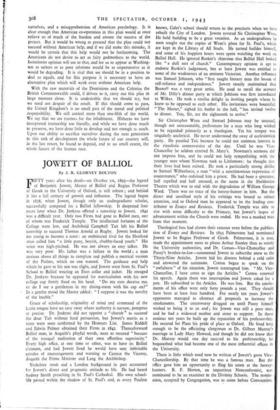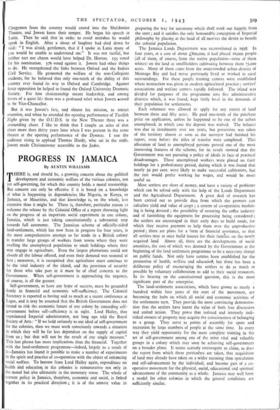JOWETT OF BALLIOL
By J. R. GLORNEY BOLTON
FIFTY years after his death—on October 1st, 1893—the legend of Benjamin Jowett, Master of Balliol and Regius Professor of Greek in the University of Oxford, is still robust ; and behind it lies a full century of growth and influence. The legend began in 1838, when Jowett, though only an undergraduate scholar, successfully competed for a Balliol fellowship. It deepened four years later when Dr. Jenkyns offered a tutorship to Jowett. 1842 was a difficult year. Only two Firsts had gone to Balliol men, one of whom was Frederick Temple. The intellectual fortunes of the College were low, and Archibald Campbell Tait left his Balliol tutorship to succeed Thomas Arnold at Rugby. Jowett looked far too young to become a tutor: an embittered rival for the Hertford once called him "a little puny, boyish, chubby-faced youth." His waice was high-pitched. He was not always an easy talker. He was very poor. His father was a failure in the world ; a man anxious above all things to complete and publish a metrical version of the Psalms, which no one wanted. The guidance and help which he gave to his son was slight, and Jowett went from St. Paul's School to Balliol wearing an Eton collar and jacket. He enraged Dr. Jenkyns because he appeared for matriculation with his new college cap firmly fixed on his head. "Do my eyes deceive me, or do I see a gentleman in my dining-room with his cap on?" In a gentler mood the Master added: "I suppose it was the novelty of the bauble."
Grace of scholarship, originality of mind and command of the Latin tongue have no easy sway where authority is narrow, pompous or precise. Dr. Jenkyns did not appoint a "cherub 4 to succeed the dour Tait without hard persuasion, but Jowett's merits as a tutor were soon confirmed by the Honours List. James Riddell and Edwin Palmer obtained their Firsts in 1842. Thenceforward Balliol men, in Asquith's playful words, were to succeed "because of the tranquil realisation of their awn effortless superiority." Every high office, at one time or other, was to have its Balliol claimant, and had Jowett lived he would have sent inifnitable epistles of encouragement and warning to Curzon the Viceroy, Asquith the Prime Minister and Lang the Archbishop.
Yorkshire stock and a London background in part accounted for Jowett's direct and pragmatic attitude to life. He had heard Sydney Smith preaching in St. Paul's Cathedral. His own school- life passed. within the shadow of St. Paul's and, as every Pauline
knows, Colet's school should return to the precincts when we have rebuilt the City of London. Jowett revered Sir Christopher Wren. He held building to be a great vocation. As an undergraduate he soon sought out the copies of Wren's plans for St. Paul's, which are kept in the Library of All Souls. He turned builder himself, and some of his happiest hours were spent watching the work on Balliol Hall. He ignored Ruskin's objection that Balliol Hall looked like "a dull sort of church." Contemporary opinion is .apt to endorse Ruskin's judgement, but at least Jowett was entitled to some of the weaknesses of an eminent Victorian. Another influence was Samuel Johnson, who "first taught literary men the lesson of self-reliance and independence." Jowett stoutly maintained that Boswell was a very great artist. He used to recall the account of Mr. Dilly's dinner party at which Joh:fison was first introduced to Wilkes. He took a similar delight in inviting people whom he knew to be opposed to each other. His invitations were bountiful. "The Master," sighed his butler in the hall, "has invited twelve to dinner. You, Sir, are the eighteenth to arrive."
Sir Christopher Wren and Samuel Johnson may be unusual, though not unreasonable, preferences for a man who long wished to be regarded' primarily as a theologian. Yet his temper was singularly unclerical. He never understood the sway of ecclesiastical party. He puzzled Tait because he could not summon interest in the ritualistic controversies of the day. Until he was Vice-
Chancellor he seldom entered St. Mary's. Newman's sermons did not impress him, and he could not help sympathising. with the younger men whom Newman took to Littlemore: he thought that
their lives had been ruined. He took a particularly strong dislike to Samuel Wilberforce, a man "with a sanctimonious expression of countenance," who ordained him a priest. He had been a spectator, half repelled and half amused, at the scene in the Sheldonian Theatre which was to end with the degradation of William George Ward. There was no trace of the heresy-hunter in him. But the direct and unstilted style of his writings was bound to attract 4ttention, and to Oxford men he appeared to be the leading con- tributor to Essays and Reviews. Frederick. Temple was able to rise with some difficulty to the Primacy, but Jowett's hopes of advancement within the Church were ended. He was a marked man from that moment.
Theological foes had shown their rancour even before the publica- tion of Essays and Reviews. In 1855 Palmerston had nominated Jowett to be Regius Professor of Greek. Palmerston, it is true, made the appointment more to please Arthur Stanley than to satisfy the University authorities, and Dr. Cotton—Vice-Chancellor and Pusey's brother-in-law—summoned Jowett to subscribe anew to the Thirty-Nine Articles. Jowett hid his distress behind a cold calm and answered the summons. Cotton began to speak on the " awfulness " of his situation. Jowett interrupted him. "Mr. Vice- Chancellor, I have come to sign the Articles." Cotton renewed his speech. Again there was interruption and Jowett asked for a pen. He subscribed to the Articles. He was free. But the emolu- ments of his office were only forty pounds a year. They should have been at least four hundred. For nearly ten years Jowett's opponents managed to obstruct all proposals to increase the emoluments. The controversy dragged on until Pusey himself wished to bring it to an end ; for Jowett was still a poor man, and he had a widowed mother and sister to support. In those anxious ten years he built up the-reputation of his professorship. He secured for Plato his pride of place at Oxford. He lived long enough to be the officiating clergyman at Dr. Gilbert Murray's marriage to Lady Mary Howard, and though he did not know that Dr. Murray would one day succeed to his professorship, he bequeathed what had become one of the most influential offices in the University.
There is little which need now be written of Jowett's great Vice- Chancellorship. By that time he was a famous man. But the office gave him an opportunity to fling his scorn at the heresy- hunters. R. F. Horton, an impenitent Nonconformist, was nominated to be an examiner in the Divinity Schools. The nomin- ation, accepted' by Congregation, was to come before Convocation. Clergymen from the country would crowd into the Sheldonian Theatre, and Jowett knew their temper. He began his speech in Latin. Then he said that in order to avoid mistakes he would speak in English. After a shout of laughter had died down he said: "I was afraid, gentlemen, that if I spoke in Latin many of you would be unable to understand me." It was not tacttul, but neither tact nor charm would have helped Dr. Horton. _155 voted for his nomination. 576 voted against it. Jowett had other things to do. He strengthened the links between Oxford and the Indian Civil Service. He promoted the welfare of the non-Collegiate students, for he believed that only one-tenth of the ability of this country ever found its way to Oxford and Cambridge. Against fierce opposition he helped to found the Oxford University Dramatic Society. For him chairmanship meant leadership, and among lovers of a quiet life there was a profound relief when Jowett seased to be Vice-Chancellor.
But it was Jowett's fate, and almost his mission, to attract attention, and when he attended the opening performance of Twelfth Night given by the O.U.D.S. in the New Theatre there was a resounding cheer. I like to think that I caught an echo of that cheer more than thirty years later when I was present in the same theatre at the opening performance of the Dynasts. I saw the audience rising to applaud Thomas Hardy, who sat in the stalls. Jowett made Christminster accessible to the Judes.



























 Previous page
Previous page